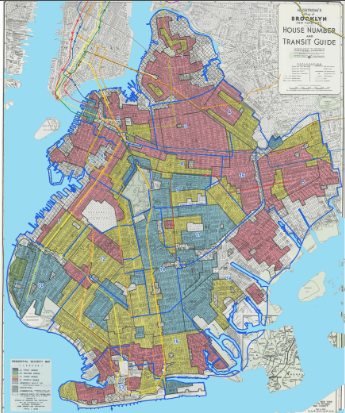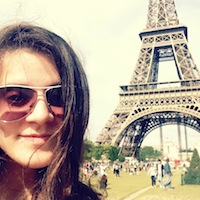Brooklyn is often thought of as a forward-thinking place, but as the writer Elizabeth Gaffney discovered while conducting research for her new historical novel When the World Was Young, it wasn’t always this way. Gaffney, who spoke last Tuesday at the Brooklyn Historical Society, shared several maps of her native Brooklyn Heights created in the 1930s and ’40s, and crisscrossed with red lines.
“Redlining,” the practice in which officials and banking administrators decided upon the neighborhoods where healthcare services and mortgages would be provided, was in most cases driven by racial animus.

Redline map of Brookyn, 1938 / National Archives via PlaNYourCity
Gaffney’s novel tells the story of a young girl named Wally living in Brooklyn Heights during the 1940s and ’50s, and it explores how racism, war, and infidelity crisscross Wally’s own life as she moves into adulthood.
Gaffney spoke with Marcia Ely, the Brooklyn Historical Society’s Vice President of Programs and External Affairs, about growing up in Brooklyn and how her observations of racial relations in the area, as well as those she observed in other parts of the country, influenced When the World Was Young. In the book, Wally becomes close friends with Ham, the son of her family’s black maid. Their relationship becomes its own kind of map, where the shifting racial politics of the period are continuously traced, erased, and redrawn.
“I would go with my family down to Washington, D.C., and my grandmother had several black servants over the course of my lifetime,” Gaffney explained during a Q&A, “and they were always black servants. She was very gracious to them, but I was troubled by the way the relationship was not actually equal.”
As she got older, those experiences helped Gaffney understand what she saw around her back home in New York City, too. “I feel like it’s a just a continuum,” she said.
And it’s one that persists. She added, “There’s no perfect equality now, and certainly less so at the time I was writing [about].”
•
Natasha Guzman is a freelance writer and Associate Editor at The Brooklyn Quarterly. She graduated from Pratt Institute with a BFA in Writing and primarily focuses on creating fiction.

